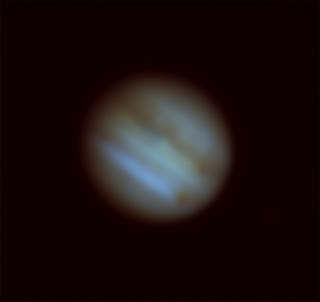Learning planetary photography - session 5 (monochrome camera with filters)
My journey into planetary photography was continuing. After four days of experimenting and making lots of mistakes, I finally got some planetary photos, but you can see I have a long way to go. I'm using similar equipment as others, and their images are fantastic. I think a reasonable goal is to get cloud patterns on Jupiter.


As they say in the Scouts, plan - do - review. My previous images were blurry, so I sought advice on a couple of forums. The experts told me to try shorter exposures. It's a balance: too much exposure time and you get motion blur caused by the atmosphere, but too much gain and you get noise - speckles that ruin the image.
The plan was to use a QHY5-III 178M, a mono camera with my filter wheel with red, green and blue filters. I wanted more resolution, but this adds a new challenge in processing. I was also using an extra Barlow, a saxon 2" ED high quality model. At 8128mm and f/40, the images are likely to be dim, especially as I'm aiming for 3-4ms exposures. I'm hoping I'm not being too ambitious.
Using FireCapture, I captured sequences of 1000 frames. I recorded these sequences through my three filters as rapidly as I could. I didn't want Jupiter rotating between sequences as it would blur when I put the colours back together. I captured several sequences for Jupiter, Saturn and Mars.
Reviewing my photos. They're larger in dimension, but I'm not sure they're much better. Jupiter's Great Red Spot indicates a better colour balance. There was an eclipse happening, so the second spot was the shadow. But the most significant problem is the noise level - you can see the speckles, so I went too far with shortening the exposure.
"If you want a better image, get better raw data".
For next time, I think I'll stick with the QHY5-III 178MM. The monochrome camera seems to give me better resolution. I'll also use just the 2" Barlow, as doubling the size hasn't added quality. Finally, I'll lengthen the exposures to around 10ms to try to lower the noise.


Comments
Post a Comment